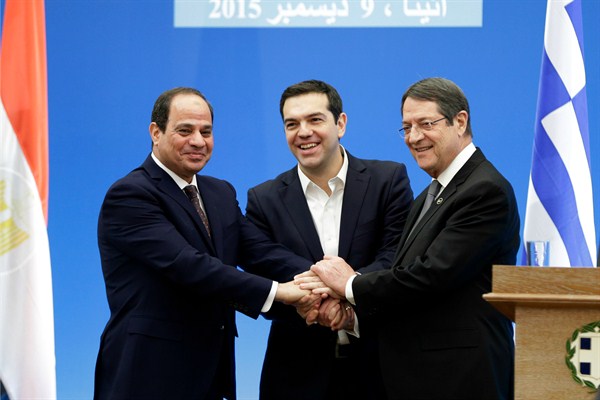https://egyptianstreets.com/2018/05/03/nostos-week-reviving-culture-of-greeks-and-cypriots-who-once-lived-in-egypt/
Nostos Week: Reviving Culture Of Greeks And Cypriots Who Once Lived In Egypt

The three heads of states of Egypt, Greece, and Cyprus have launched a week-long "Nostos: Reviving Roots" cultural event in Alexandria on Monday.
The cultural week was inaugurated to give an opportunity for Greek and Cypriot diasporas who once lived in Egypt to reunite with their old homes, also in an attempt to boost the trilateral relations between the three countries that have significantly flourished since Egypt's president Abdel Fattah al-Sisi assumed the presidency in 2014. During an economic forum held on the sidelines of the Nostos week in Egypt's city of Alexandria, Egypt signed multiple cooperation agreements with Greece and Cyprus. The agreements and protocols signed between the three countries aim at boosting economic, commercial, and industrial cooperation.
The three state representatives,Abdel Fattah al-Sisi (Egypt), Prokopis Pavlopoulos (President of Greece) and Nicos Anastasiades (President of Cyprus) gathered for five tripartite summits over the past four years. Held between 30 April and 6 May, Nostos week is taking place in Alexandria, Cairo and Sharm al-Shiekh resort in the Red Sea. Al-Sisi said during his opening speech that Alexandria has always been embodying coexistence.
"Nostos" is a Greek word that translates as "return to the roots". According to an interview with Al Ahram, the word "Nostos" was chosen by Egypt's Minister of State for Emigration and Egyptian Expatriates' Affairs Nabila Makram and emigration ministers from Greece and Cyprus while they were preparing the event. The theme of returning home was used in ancient Greek literature which often alluded to an epic hero returning home by sea such as Ulysses in the Odyssey.
Minister of Trade and Industry Tarek Kabil stated during the signing ceremony that the amount of trade between Egypt and Greece has reached some 400 million Euros, according to Ahram Online. Additionally, Director of Cyprus' Department of Antiquities, Marina Solomidou returned 14 smuggled artifacts from Cyprus to Egypt that are believed to have been smuggled from Egypt in the late 1980's.
Egypt's Minister of Antiquities Khaled Anany praised the Cypriot authorities for their continuous cooperation with Egypt to restore the smuggled artifacts. Meanwhile, Egypt and Cyprus sealed several gas deals in recent weeks.
Mary Aravanis, Greek-Egyptian citizen tells Egyptian Streets that she believes Nostos week is a nice initiative and a good idea.
"Everyone likes to get in touch with their roots and go back to their origins," says Aravanis, adding, "However, I am not sure what the long-term effects [of Nostos week] are. For now, it's nice and people will enjoy it."
However, not all have shared the shame excitement for the event. Another Greek-Egyptian, Chris*, says that he is not really aware of the target of Nostos week given that there is no will to preserve any Greek culture [in Egypt]. He mentioned an example of the removal of Cairo and Alexandria gates as they were Greek architecture, but they were replaced with "aluminum monstrosity".
"I don't think anybody cares about Greek-Egyptian relations, this event will have no impact," he concludes.
In the past, Egypt used to have large diasporas of Greeks and Cypriots, Alexandria in particular. By the end of the 18th century, the Greek communities represented half of the inhabitants of Alexandria, according to DotMsr. They used to be an integral part of the Egyptian society and were featured in old movies.
However, the vast majority had to leave in light of the nationalization policies of former Egyptian president Gamal Abdel Nasser in 1952 that left these communities financially challenged and turned the ownership of most of their properties to the Egyptian state.
*Name has been changed to respect the anonymity of the source.
-- Sent from my Linux system.
No comments:
Post a Comment